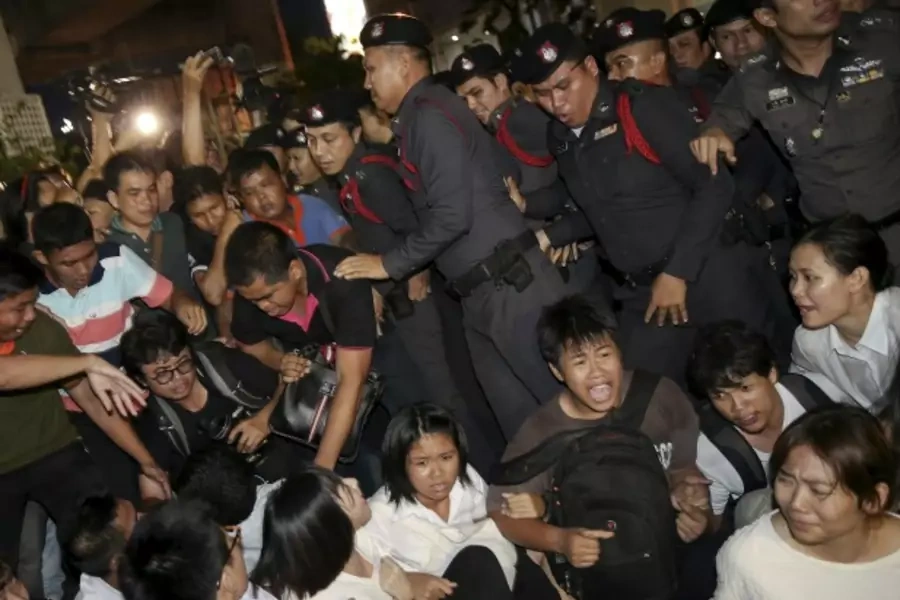More on:
This past week marks one year since Thailand’s most recent military coup, either the 19th or the 18th in the kingdom’s modern history, depending on how one counts putsch attempts. The year since the coup has revealed a range of lessons, most of which bode poorly for Thailand’s future.
The Coup Was Not Good for Any Politicians
Although the coup was preceded by months of street protests in Bangkok led by former Democrat Party politicians, and attended primarily by Democrat Party supporters, the leaders of the Democrat Party have been surprised to find that the junta wants to reduce the role of all elected politicians in Thailand, even if the military has focused its energies on eliminating the power of the Shinawatra family. True, former prime minister Thaksin Shinawatra remains in exile, hundreds of former Peua Thai politicians may be banned from politics for life, and former prime minister Yingluck Shinawatra now faces trial on charges of negligence related to her government’s ill-fated plan to pay Thai farmers for their rice crops. But though the junta has not prosecuted Democrat Party politicians aggressively, Democrat leaders who presumed that the junta would quickly hand power to a civilian, pro-Democrat government, and publicly embrace Democrat leaders, have been disappointed. Prayuth and other army leaders have displayed disdain for the entire spectrum of Thai politicians, which is why Democrat leader Abhisit Vejjajiva, who in the months after the coup expressed hope that the intervention would produce positive change, now is telling Thai reporters that the charter drafted under the coup is undemocratic and should be amended, and that the junta leaders must “open a forum and open their minds.”
The Story Behind the Coup Remains Murky
According to the Thai military’s telling of the May 2014 coup, army intervention was necessitated by the constant squabbling of elected politicians, the venality of the Peua Thai government, and the gridlock created by the long-running standoff between Peua Thai leaders and the anti-Shinawatra protestors who had paralyzed Bangkok for months. A year later, some evidence suggests that, contrary to the army’s story that it only considered intervention at the last moments in May, the generals had planned a coup for many months. Thaksin, who was quiet for months, now contends that senior advisors to the palace helped foment the street protests and then mastermind the coup, although this story seems difficult to believe, given the well-known tension between senior palace advisor Prem Tinsulanonda and junta leader Prayuth Chan-ocha.
Thailand’s Major Problems Remain the Same
Regardless of the genesis of the coup, a year later few of the challenges cited by the coup-makers as reasons for their intervention have been addressed. Although the military is assiduously trying to remove the Shinawatras and their allies from politics forever, there is no evidence that the unelected government has made inroads against graft. The first six months after the coup, during which the junta faced numerous scandals over alleged graft in government purchases, deflated any hopes that the army was going to seriously fight corruption.
More important, Thailand’s politics remain as paralyzed as ever. Although Prayuth appears to be hanging onto power, delaying elections repeatedly, eventually---probably in late 2016---he will hand back power to an elected government. The new constitution, if it is approved in a referendum, will make that elected government weaker than its predecessors in the 2000s and 2010s, strengthening the power of unelected parts of the bureaucracy. Still, the pool of elected MPs will still almost surely be dominated by Peua Thai supporters, even under the constitution’s system of proportional representation. This elected government will probably clash with the elite-dominated unelected bodies set up by the new constitution, and possibly with the military and the palace as well.
Meanwhile, no institutions have been created to mediate political conflicts---only ones to investigate and possibly punish elected leaders. There’s nothing wrong with investigation and punishment, but Thailand also needs mediators, conflict resolvers, and compromisers outside of the military and the palace, the institutions that have been charged with resolving conflicts for all of Thailand’s modern history. The coup has not brought the country closer to compromise or created alternatives to solving any future political gridlock other than another coup.
More on:
 Online Store
Online Store
